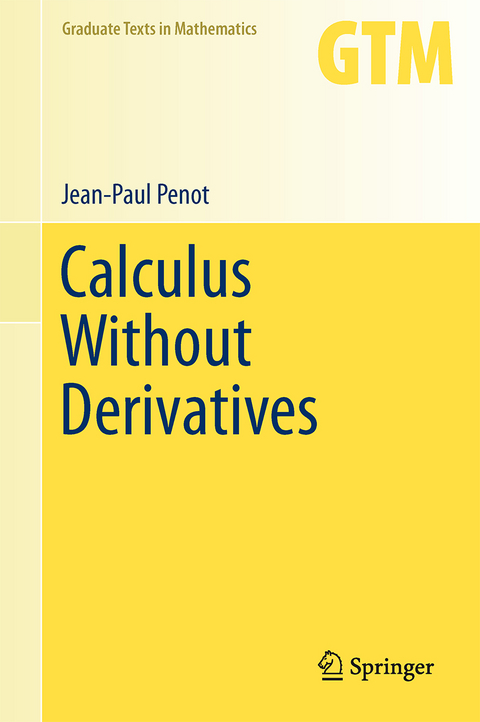
Calculus Without Derivatives
Seiten
2014
Springer-Verlag New York Inc.
978-1-4899-8942-0 (ISBN)
Springer-Verlag New York Inc.
978-1-4899-8942-0 (ISBN)
Calculus Without Derivatives expounds the foundations and recent advances in nonsmooth analysis, a powerful compound of mathematical tools that obviates the usual smoothness assumptions. The second one presents the classical tools of differential calculus and includes a section about the calculus of variations.
Calculus Without Derivatives expounds the foundations and recent advances in nonsmooth analysis, a powerful compound of mathematical tools that obviates the usual smoothness assumptions. This textbook also provides significant tools and methods towards applications, in particular optimization problems. Whereas most books on this subject focus on a particular theory, this text takes a general approach including all main theories.
In order to be self-contained, the book includes three chapters of preliminary material, each of which can be used as an independent course if needed. The first chapter deals with metric properties, variational principles, decrease principles, methods of error bounds, calmness and metric regularity. The second one presents the classical tools of differential calculus and includes a section about the calculus of variations. The third contains a clear exposition of convex analysis.
Calculus Without Derivatives expounds the foundations and recent advances in nonsmooth analysis, a powerful compound of mathematical tools that obviates the usual smoothness assumptions. This textbook also provides significant tools and methods towards applications, in particular optimization problems. Whereas most books on this subject focus on a particular theory, this text takes a general approach including all main theories.
In order to be self-contained, the book includes three chapters of preliminary material, each of which can be used as an independent course if needed. The first chapter deals with metric properties, variational principles, decrease principles, methods of error bounds, calmness and metric regularity. The second one presents the classical tools of differential calculus and includes a section about the calculus of variations. The third contains a clear exposition of convex analysis.
Jean-Paul Penot is an Emeritus Professor at Université Paris 6. He has taught in Paris, Pau and Canada.
Preface.- 1 Metric and Topological Tools.- 2 Elements of Differential Calculus.- 3 Elements of Convex Analysis.- 4 Elementary and Viscosity Subdifferentials.- 5 Circa-Subdifferentials, Clarke Subdifferentials.- 6 Limiting Subdifferentials.- 7 Graded Subdifferentials, Ioffe Subdifferentials.- References.- Index.
| Reihe/Serie | Graduate Texts in Mathematics ; 266 |
|---|---|
| Zusatzinfo | XX, 524 p. |
| Verlagsort | New York |
| Sprache | englisch |
| Maße | 155 x 235 mm |
| Themenwelt | Mathematik / Informatik ► Informatik ► Theorie / Studium |
| Mathematik / Informatik ► Mathematik ► Algebra | |
| Mathematik / Informatik ► Mathematik ► Analysis | |
| Mathematik / Informatik ► Mathematik ► Angewandte Mathematik | |
| Mathematik / Informatik ► Mathematik ► Finanz- / Wirtschaftsmathematik | |
| ISBN-10 | 1-4899-8942-0 / 1489989420 |
| ISBN-13 | 978-1-4899-8942-0 / 9781489989420 |
| Zustand | Neuware |
| Haben Sie eine Frage zum Produkt? |
Mehr entdecken
aus dem Bereich
aus dem Bereich
Grundlagen – Anwendungen – Perspektiven
Buch | Softcover (2022)
Springer Vieweg (Verlag)
34,99 €
was jeder über Informatik wissen sollte
Buch | Softcover (2024)
Springer Vieweg (Verlag)
37,99 €
Eine Einführung in die Systemtheorie
Buch | Softcover (2022)
UTB (Verlag)
25,00 €


